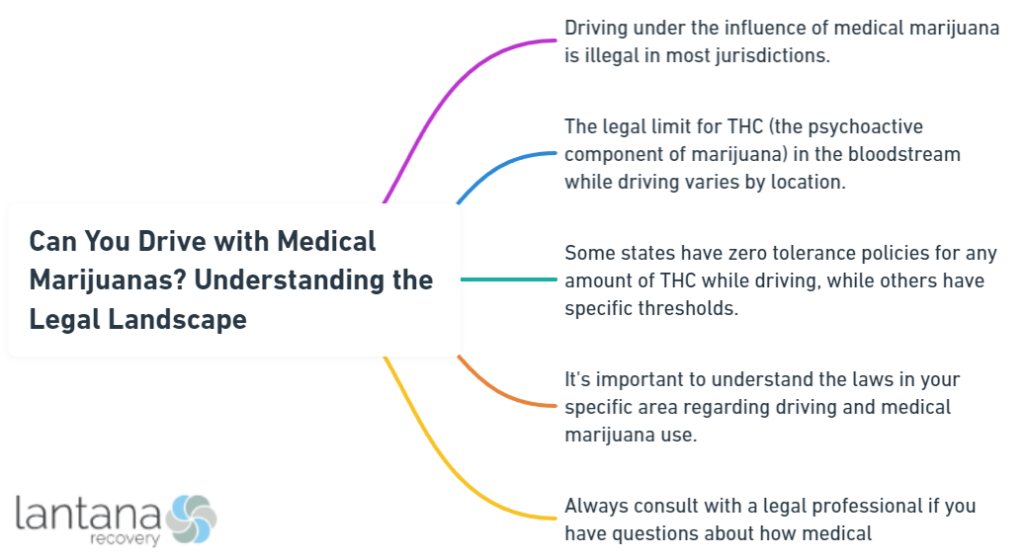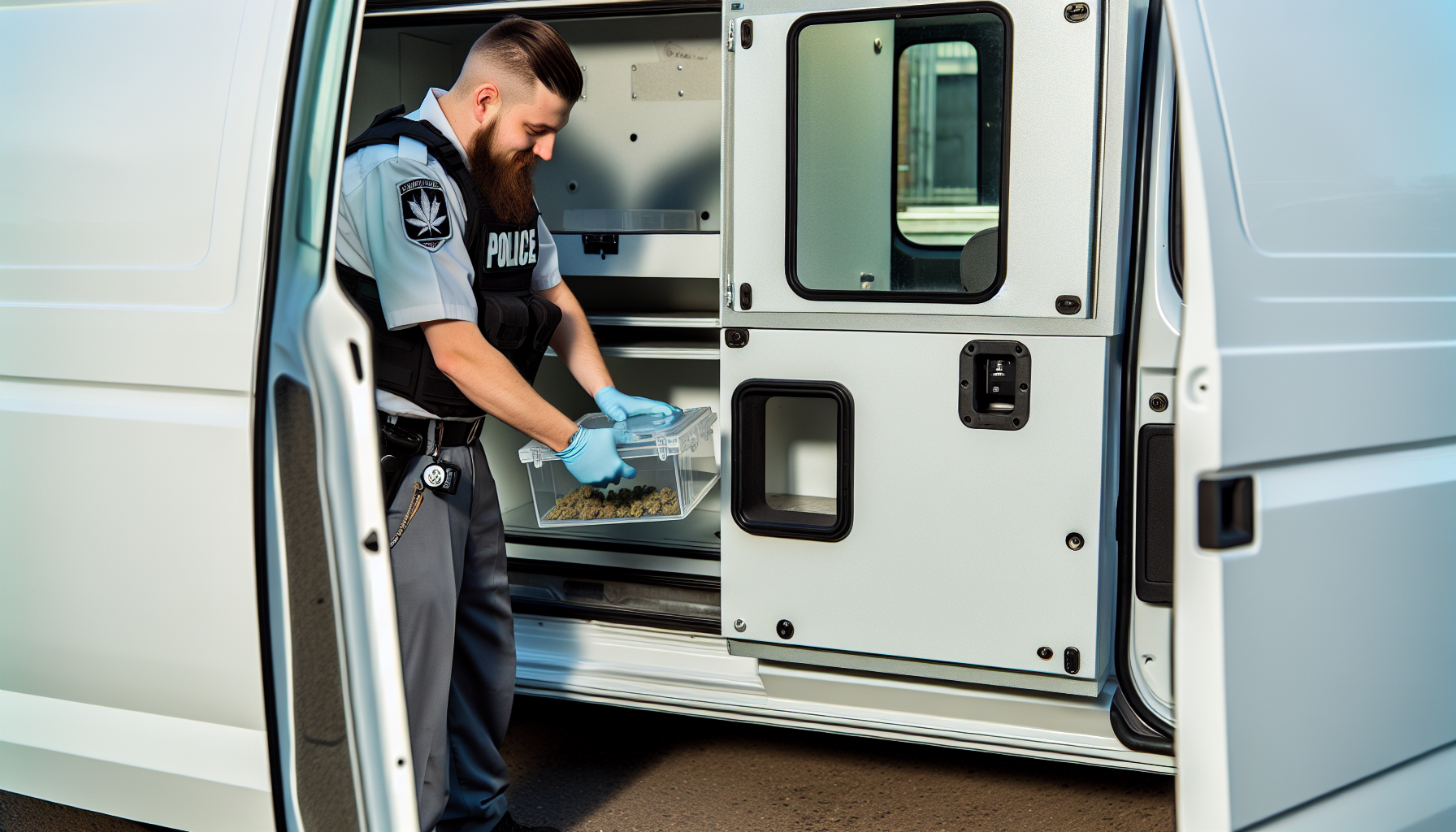Can you legally drive if you’re a medical marijuana patient? “Can you drive with medical marijuanas” is a common question among patients. Driving while under the influence of medical marijuana is illegal, even if you have a medical card. However, the enforcement and legal repercussions can vary widely depending on where you live. This article will provide a nuanced exploration of how different jurisdictions approach driving under the influence of medical cannabis and what you need to know to stay on the right side of the law.
Key Takeaways
- Driving under the influence of marijuana is federally illegal and state DUI laws for medical marijuana patients vary, with penalties potentially including fines, jail time, and suspension of driving privileges.
- Transporting medical marijuana in a vehicle requires adherence to strict regulations, such as secure storage and direct transit, to avoid legal issues, and possessing marijuana can give police cause to search a vehicle.
- Medical marijuana patients must be careful about interstate travel as it is a federal offense to cross state lines with medical marijuana, and they face legal complexities and risks regardless of state laws.
Medical Marijuana and Driving: The Legalities

Diving into the issue of medical marijuana and driving, you’ll find a complex legal matrix. Even as a registered medical marijuana patient, the road isn’t free of legal speed bumps. While your medical marijuana card symbolizes a lawful path to purchase medical marijuana for health-related needs, it doesn’t clear the haze when it comes to DUI laws.
The hard truth is, irrespective of your status as a medical cannabis patient, driving under the influence of marijuana is still federally illegal. This blanket prohibition exists alongside state-specific regulations that can range from stringent to more permissive, causing a patchwork of laws surrounding medical marijuana that every motorist using medical cannabis must navigate.
Federal Law vs. State Law
Unchanged by state decisions, federal law casts a shadow over medical marijuana use. Although states like Florida have embraced medical marijuana, allowing registered patients to purchase medical cannabis, the federal government maintains a firm stance against it. At the federal level, marijuana remains an illegal substance, and these laws trump state law when conflicts arise. It’s a legal tug-of-war, leaving medical marijuana patients in a precarious position.
The complexities and evolving nature of medical marijuana laws across different states prove challenging for even legal experts, highlighting the difficulties laypersons face in keeping up with the legal landscape.

DUI Laws for Medical Marijuana Patients
When addressing DUI for medical marijuana patients, state laws vary greatly. Some focus on actual impairment, assessing whether a patient’s driving related skills are compromised, while others operate under ‘zero tolerance’ policies that penalize the mere presence of THC, the psychoactive component of cannabis, in the system. Officers on the frontline use a combination of field observations and drug testing to detect cannabis impairment. Some signs of impairment include:
- impaired motor functions
- impaired speech
- bloodshot or red eyes
- slowed reaction time
- poor coordination
It is important for medical marijuana patients to be aware of the laws in their state, including the medical marijuana use registry, and to use caution when operating a motor vehicle, especially when using medicinal marijuana.
However, detecting THC in a blood or urine test doesn’t necessarily imply current impairment, further complicating the situation for medical marijuana users. The consequences for a marijuana DUI align with other DUI convictions, potentially leading to harsh penalties like fines, jail time, and the suspension of driving privileges. Yet, having a lawful medical marijuana prescription might offer a glimmer of hope, serving as a possible defense in certain charges.
Interestingly, studies have shown that per se DUID laws, which penalize driving with a certain concentration of THC, don’t correlate with safer roads or fewer traffic fatalities, raising questions about their effectiveness.
Alcohol Rehab in South Carolina
Alcohol rehab in South Carolina offers a range of services tailored to individuals struggling with alcohol addiction. These facilities provide comprehensive treatment programs designed to address the physical, emotional, and psychological aspects of alcohol dependence. With a focus on evidence-based therapies and personalized care plans, alcohol rehab centers in South Carolina strive to help individuals overcome addiction and achieve long-term sobriety. From detoxification and counseling to ongoing support and aftercare, these programs aim to equip individuals with the tools and resources needed to maintain a sober lifestyle. Moreover, many alcohol rehab centers in South Carolina offer a supportive and nurturing environment conducive to healing and recovery, fostering a sense of community among participants on their journey to wellness.
Driving with Medical Marijuana in Your Vehicle

Carrying medical marijuana in your vehicle is not as simple as putting your groceries in the trunk. Ohio’s stringent regulations serve as an example, mandating the following requirements for transporting medical marijuana:
- Locked, secure storage
- Presence of two registered employees during transport, one of whom must stay with the vehicle containing medical marijuana at all times
- Unmarked vehicle, with only manufacturer or dealership logos
- Insurance as per state law
- Direct journey from point A to B, with no unnecessary stops
These regulations must be followed to comply with the law.
Even registered medical marijuana patients must take care when transporting their medication, making sure it is sealed and placed in the trunk to prohibit access while driving. Beware, the mere scent of marijuana can empower police officers with probable cause to search your vehicle, potentially leading to charges beyond a simple traffic infraction.
Assessing Impairment from Medical Marijuana Use
For law enforcement officers, evaluating impairment from medical marijuana use can feel like walking a tightrope. They leverage a suite of field sobriety tests, like walk and turn or horizontal gaze nystagmus, to judge impairment. Physical signs such as red eyes and delayed reaction times are tell-tale giveaways of marijuana use.
THC’s effect on body movement, balance, and judgment can impair critical driving abilities, yet no consensus exists on a definitive blood THC level that signifies impairment due to its variable effects on individuals. This leaves officers relying heavily on their observations, which can be subjective and influenced by a patient’s tolerance to THC, especially in chronic users.
Medical Marijuana Patient Rights and Responsibilities

Possessing a medical marijuana card brings with it a myriad of rights and responsibilities. In Ohio, patients can designate caregivers to assist with their medical cannabis needs, but these caregivers must meet regulatory requirements, such as passing a background check and registering with the medical marijuana certification program.
Patients must judiciously assess their impairment level and ability to drive safely following cannabis use, a decision that should err on the side of caution. The consequences of miscalculation are steep; a DUI conviction not only carries the usual legal repercussions but can also jeopardize one’s medical marijuana privileges.
Cross-State Travel with Medical Marijuana

It’s a federal offense to cross state lines with medical marijuana, a fact that remains true regardless of the views on medical cannabis in your departure or destination state. Ohio’s non-recognition of out-of-state medical marijuana cards epitomizes the interstate legal complexities that patients face. The Controlled Substances Act is unyielding, penalizing the transport of marijuana with mandatory sentences for larger amounts. Whether by air or by road, patients risk federal criminal charges when attempting to carry their medication across borders, entangling them in legal snares that can have long-lasting repercussions.
Despite the low practical risk of federal enforcement, the journey remains fraught with legal ambiguities and perils.
Why Do People Smoke
“Why do people smoke?” is a question that has intrigued researchers and health professionals for decades. There isn’t a single answer that applies to everyone, as smoking behavior is influenced by a myriad of factors. For some individuals, smoking serves as a coping mechanism to deal with stress or anxiety, providing a temporary escape from life’s pressures. Social influences also play a significant role, as smoking often becomes ingrained within certain social circles or cultural norms. Additionally, addiction to nicotine, a highly addictive substance found in tobacco, keeps many individuals trapped in the habit despite being aware of the associated health risks. Furthermore, marketing and advertising tactics employed by tobacco companies have historically glamorized smoking, contributing to its widespread acceptance in society. Overall, understanding why people smoke involves examining a complex interplay of psychological, social, and biological factors.
Tips for Responsible Medical Marijuana Use and Driving
For those prescribed medical marijuana, accurately assessing personal marijuana impairment is of utmost importance. While some patients may overestimate their impairment, others may not fully grasp their driving related skills’ diminishment after consuming cannabis.
Public education campaigns advise the following guidelines for driving after using cannabis:
- Wait at least 8 hours after feeling subjectively high before getting behind the wheel
- This guideline can vary depending on the type of cannabis product used
- These recommendations are not just to stay on the right side of the law but to ensure one’s safety and that of others on the road.
Educating Law Enforcement on Medical Marijuana Laws
As the landscape of marijuana laws changes, so too must the understanding of those responsible for enforcing them. Police officers require training to stay current with the shifting legal and social landscapes of marijuana use. Dedicated training programs and sessions are being developed to provide law enforcement with the necessary knowledge to navigate the complexities of medical and recreational marijuana laws.
Colorado’s pioneering Marijuana Team and legislative actions like Senate Bill 14-215 are examples of efforts to enhance officers’ expertise and ensure they are equipped to handle marijuana legalization’s myriad scenarios.
Can You Drink Alcohol on Antibiotics?
The question of whether you can drink alcohol on antibiotics is a common one, and the answer largely depends on the specific antibiotic you’re taking. While some antibiotics can be safely taken with moderate alcohol consumption, others can have adverse effects when combined with alcohol. It’s crucial to read the label or consult your healthcare provider to understand any potential interactions. Alcohol can interfere with the effectiveness of certain antibiotics and may exacerbate side effects such as dizziness, nausea, or stomach upset. To err on the side of caution, it’s generally recommended to avoid alcohol while on antibiotics to ensure optimal treatment and avoid any complications. If you’re unsure, always seek guidance from your doctor or pharmacist.
Navigating Legal Challenges as a Medical Marijuana Patient
Navigating DUI charges or car accident complications, medical marijuana patients must proceed with caution. Legal counsel experienced in navigating the intricacies of medical marijuana laws can provide invaluable guidance. Strategies may involve demonstrating compliant use within legal guidelines or leveraging a tolerance defense, arguing that a patient’s chronic use has diminished THC’s effect on cognitive function.
Car accidents can become complex legal mazes for patients, where the presence of THC in the system complicates insurance claims and may influence the compensation received. In Ohio, despite the legality of medical marijuana, usage can have unexpected legal ramifications during post-accident proceedings.
Summary
The journey through the legal landscape of driving with medical marijuana is fraught with twists and turns, but with knowledge, patients can navigate it more confidently. From understanding the dichotomy between federal and state laws to the specifics of DUI and transportation regulations, patients must remain vigilant and informed. Remembering that medical marijuana use does not excuse driving under the influence and recognizing the potential legal pitfalls of interstate travel are crucial. Armed with this understanding and a commitment to responsibility, patients can use their medicine without undue fear of legal repercussions.
Frequently Asked Questions
Can you get a DUI with a medical card in PA?
Yes, in Pennsylvania, showing your state medical marijuana card to law enforcement can result in a DUI charge. Be cautious and consider alternative transportation options.
Can cops see if you have a medical card in Florida?
No, police officers cannot see if you have a medical card in Florida unless you authorize access. If you have cannabis medication in your possession, it’s important to disclose your registry status to the officer.
What happens if you get pulled over while high?
If you get pulled over while high, admitting to the officer that you are high can result in arrest. The officer may also ask you to submit to a blood test, and refusal can lead to an automatic loss of your driver’s license.
Can you smoke in your car with a medical card in Florida?
No, it is strictly prohibited to smoke marijuana, even with a medical card, while in your car or driving in Florida.
How do law enforcement officers assess if someone is driving under the influence of medical marijuana?
Law enforcement officers assess impairment from medical marijuana by using field sobriety tests, observing physical signs like red eyes and delayed reaction times, and may also employ blood and urine tests to detect THC, recognizing the limitations of these tests in indicating current impairment.









